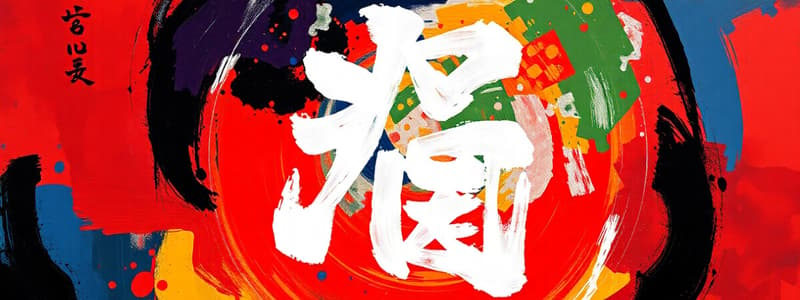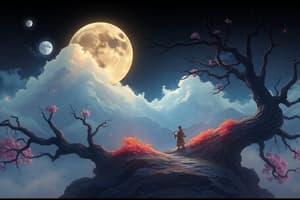Podcast
Questions and Answers
What does the concept of Wu Wei primarily emphasize?
What does the concept of Wu Wei primarily emphasize?
- Inactive behavior to avoid engagement
- The rejection of natural instincts
- Effortless action aligned with the Dao (correct)
- Strict adherence to social norms
Which theme does the Zhuangzi NOT focus on?
Which theme does the Zhuangzi NOT focus on?
- The importance of releasing attachment
- The promotion of social conventions (correct)
- Relativism and subjectivity
- The interconnectedness of all things
How does the Zhuangzi approach the concept of the self in relation to the universe?
How does the Zhuangzi approach the concept of the self in relation to the universe?
- The self is a representation of social identity
- The self is intrinsically connected to the cosmos (correct)
- The self is independent from the universe
- The self is the center of all existence
What is meant by the term Ziran in the context of Daoism?
What is meant by the term Ziran in the context of Daoism?
What is a significant characteristic of the Zhuangzi's style?
What is a significant characteristic of the Zhuangzi's style?
What philosophical technique frequently used in the Zhuangzi encourages critical thinking?
What philosophical technique frequently used in the Zhuangzi encourages critical thinking?
According to the Zhuangzi, how should one perceive the nature of truth and reality?
According to the Zhuangzi, how should one perceive the nature of truth and reality?
In which way does the Zhuangzi critique conventional wisdom?
In which way does the Zhuangzi critique conventional wisdom?
What primary literary devices are used in the Zhuangzi to convey complex ideas?
What primary literary devices are used in the Zhuangzi to convey complex ideas?
Which concept does the Zhuangzi challenge regarding the relationship between humans and nature?
Which concept does the Zhuangzi challenge regarding the relationship between humans and nature?
In what manner does the Zhuangzi critique knowledge?
In what manner does the Zhuangzi critique knowledge?
What is the significance of the structure in the Zhuangzi?
What is the significance of the structure in the Zhuangzi?
Which theme emphasizes that reality can be subjective?
Which theme emphasizes that reality can be subjective?
What role does Zhuang Zhou play in the Zhuangzi?
What role does Zhuang Zhou play in the Zhuangzi?
Which concept is emphasized as part of the ideal action in the Zhuangzi?
Which concept is emphasized as part of the ideal action in the Zhuangzi?
What aspect of the Zhuangzi has influenced modern thought?
What aspect of the Zhuangzi has influenced modern thought?
Flashcards
Dao (The Way)
Dao (The Way)
A fundamental, underlying principle that governs the universe, described as spontaneous, natural, and unconstrained by human definitions.
Wu Wei (Non-action)
Wu Wei (Non-action)
Acting in accordance with the Dao; emphasizing effortless action, letting the natural order unfold without interference.
Ziran (Naturalness)
Ziran (Naturalness)
Embracing inherent qualities and allowing things to be as they are, aligning with the Dao.
Transformation and Flux
Transformation and Flux
Signup and view all the flashcards
Relativism and Subjectivity
Relativism and Subjectivity
Signup and view all the flashcards
The Self and the Universe
The Self and the Universe
Signup and view all the flashcards
The Importance of Releasing Attachment
The Importance of Releasing Attachment
Signup and view all the flashcards
The Rejection of Social Conventions
The Rejection of Social Conventions
Signup and view all the flashcards
Humor and Satire
Humor and Satire
Signup and view all the flashcards
Metaphors
Metaphors
Signup and view all the flashcards
Experience over Logic
Experience over Logic
Signup and view all the flashcards
Critique of Knowledge Claims
Critique of Knowledge Claims
Signup and view all the flashcards
The Illusion of Separation
The Illusion of Separation
Signup and view all the flashcards
Relativity of Reality
Relativity of Reality
Signup and view all the flashcards
Nature of the Self
Nature of the Self
Signup and view all the flashcards
Illusion of Time
Illusion of Time
Signup and view all the flashcards
Study Notes
Overview of the Book of Chuang Tzu
- The Zhuangzi (Chuang Tzu) is a foundational text of Daoism, a philosophical school of thought that emerged in ancient China.
- It's attributed to the philosopher Zhuang Zhou, but scholars debate the extent to which the text reflects his teachings or those of later followers.
- The work is primarily comprised of anecdotes, parables, and philosophical arguments, rather than systematic treatises.
- Its core themes revolve around the concept of the Dao (the Way), non-action (wu wei), and the interconnectedness of all things.
- It often employs paradoxical thought and satire to challenge conventional wisdom and explore the nature of reality, knowledge, and the self.
- The text is renowned for its poetic beauty, humor, and profound insight into the human condition.
Key Concepts in the Zhuangzi
- Dao (The Way): This is a fundamental, underlying principle that governs the universe. It's described as spontaneous, natural, and unconstrained by human definitions.
- Wu Wei (Non-action): Not passivity, but rather acting in accordance with the Dao. It emphasizes effortless action, letting the natural order unfold without interference.
- Ziran (Naturalness): Embracing inherent qualities and allowing things to be as they are. This aligns with the Dao.
- Transformation and Flux: The world is not static; everything is in constant change. Constancy is an illusion.
- Relativism and Subjectivity: Truth and reality can be perceived differently depending on the individual perspective, underscoring the limitations of human knowledge.
- The Self and the Universe: The individual self is intrinsically connected to the larger cosmos, highlighting the interconnectedness of all things.
- The Importance of Releasing Attachment: This freeing oneself from attachments helps one realize the unconstrained nature of the Dao.
- The Rejection of Social Conventions: The Zhuangzi often critiques societal norms, highlighting the limitations of conventional ways of thinking.
Philosophical Styles and Techniques
- Parables and Anecdotes: The Zhuangzi employs numerous stories to illustrate philosophical points. This makes complex ideas more accessible and memorable.
- Paradoxical Arguments: The text frequently presents seemingly contradictory ideas, promoting critical thinking and non-dogmatic approaches to understanding.
- Humor and Satire: The Zhuangzi incorporates humor and satire to critique societal norms and encourage reflection.
- The Use of Metaphors: Complex concepts are conveyed using metaphors, similes, and other literary devices to enrich the text's meaning.
- Emphasis on Experience over Logic: The Zhuangzi places a strong emphasis on intuition and experiential knowledge as valuable sources of insight.
- Critique of Knowledge Claims: The text questions the very nature of knowledge and its limitations.
Themes and Motifs
- The Illusion of Separation: The text challenges the concept of separation between humans, nature, and the divine.
- The Relativity of Reality: The Zhuangzi emphasizes that our understanding of reality is often subjective rather than objective.
- The Nature of the Self: The Zhuangzi explores numerous perspectives on the human self, highlighting its complexity and interconnectedness with the universe.
- The Illusion of Time: Time and change is not a straight line; it’s a cyclical process, a continuous state of transformation.
- The Significance of Simplicity and Effortlessness: These concepts connect to the ideal action that aligns with the natural order of things.
Key Figures and Their Roles
- The central character in the book is Zhuang Zhou himself, though it's challenging to separate Zhuang Zhou the person from the persona presented in the work.
- Other figures appear in the stories, and they represent facets of the broader philosophical exploration, in the process helping to illustrate the key ideas in the text.
- Key figures illustrate facets of the exploration, which shows the philosophical intent and meaning.
Structural Elements
- The Zhuangzi is not structured with chapters and section headings in a rigid manner. Rather, it's presented in a free-flowing, often cyclical fashion.
- This structure is intentional, emphasizing the Dao's natural qualities.
- The narrative sections are rich in symbolic meaning, which are woven throughout the text.
Influence and Legacy
- The Zhuangzi has had a significant impact on Chinese philosophy, art, and culture.
- The ideas in the text continue to resonate in modern thought.
- Its focus on non-action has implications for the appreciation of balance, harmony, and harmony between the self and the world.
- Its philosophical inquiries have inspired artistic endeavors and continue to influence discussions about the human condition.
Studying That Suits You
Use AI to generate personalized quizzes and flashcards to suit your learning preferences.

